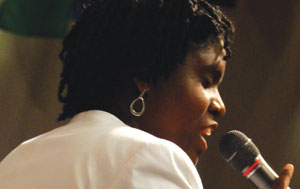The Gospel Revolution
Where is gospel going? For this spiritually-grounded music genre, the question is a weighty one, in which growing the ministry without compromising its music remains a central issue.
While some see change as a way of reaching out to the mainstream, others are not so sure. Karen Burke, director of the Toronto Mass Choir (TMC), sees the evolution as a way to connect with a larger audience. “The influence of R&B to gospel has given gospel a new face,” says Burke. “I believe that is a good thing, the ability to connect with a new and growing audience has a trickle down effect for gospel musicians around the world.”
Across Canada, the new-found appeal of gospel music has translated into more album sales, larger tours and greater recognition. After the TMC launched its sixth record, Going Home, it played to a packed Toronto audience.
Watch Toronto Mass Choir’s Going Home Medley from the 15th anniversary concert at Toronto’s People’s Church, 2003.
“Gospel music is picking up around the world — we now perceive the world as our stage. We recognize there is a hunger for this music [here] and around the world,” says Burke.
The Montreal Jubilation Gospel Choir (MJGC) is another Canadian group at the forefront of the gospel revolution. Trevor Payne, director of the MJGC and a world-renowned authority on gospel music comments: “Gospel music in Canada is doing better commercially than five years ago, but I don’t feel it‘s doing better spiritually due to the ‘pop’ elements in contemporary gospel that are borrowed from mainstream black music, such as rap and hip-hop.”
Watch the Montreal Jubilation Gospel Choirs’ performance of Gloria
That the MJGC is establishing itself as a major gospel force in Europe makes Payne all the more driven to deliver the pure unadulterated gospel goods. And though Payne favours traditional technique, his attitude shouldn’t be mistaken as being musically out of touch. The group’s most recent album, I’ll Take You There, includes elements of secular sound infused into the soundtrack.
But even as gospel music connects with a growing and energetic following, there are hurdles ahead. Since it’s in the nature of gospel to address issues, the genre’s songwriters are hovering on the edge of the next wave of socially conscious gospel music. Issues such as poverty, racism and homosexuality have found their way into the music, creating a divide between traditionalists and contemporary performers. Instead of seeing the genre as divisive, it should be used as a tool to embrace all communities.
“I find it disturbing that some folks equate being Christian with being intolerant,” says Payne. “That may unfortunately be true for some, but it’s not true for me… the Bible teaches us to love one another.” Amen to that.







Leave your response!